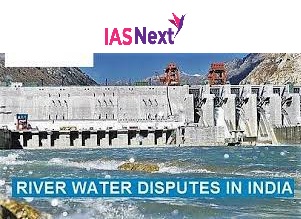CURRENT AFFAIRS
Get the most updated and recent current affair content on Padhaikaro.com
Inter-State River Water Disputes Act, 1956
- IAS NEXT, Lucknow
- 19, Jan 2022

Reference News:-
Karnataka CM Recently observed that the time has come to revisit the Inter-State River Water Disputes Act as it creates more disputes than resolving them.
- The chief minister’s statement comes at a time when Karnataka has been involved in inconstant fight with neighbouring Tamil Nadu, Maharashtra, Goa and Andhra Pradesh regarding inter-state water disputes concerning Cauvery, Mahadayi and Krishna rivers.
Need of the hour:
- The multifold levels of addressing the inter-state water disputes are removed at one single stage.
- The solution should be on the basis of maximum utility of a river basin capacity and using technology, and giving away all political considerations.
Inter-state water dispute:
Art 262 provides for the adjudication of inter-state water disputes. It has two following provisions:
- Parliament may by law provide for the adjudication of any dispute or complaint with respect to the use, distribution and control of waters of any inter-state river and river valley.
- Parliament may also provide that neither the Supreme Court nor any other court is to exercise jurisdiction in respect of any such dispute or complaint.
Under the provisions of the act, the central government has enacted, River boards act (1956) and Inter-state water disputes act (1956).
- The river board act provides for the establishment of river boards for the regulation and development of the Inter-state River and river valleys. Such a river board is established on the request of the state governments concerned.
- The inter-state water dispute act empowers the central government to set up an ad hoc tribunal for the adjudication of a dispute between the two or more states in relation to the water of an inter-state river. The decision of the tribunal would be final and binding. Furthermore, the act bars the SC and any other court to have jurisdiction in this matter.
Issues surrounding the interstate Water Dispute Act, 1956:
The Inter State Water Dispute Act, 1956 which provides the legal framework to address such disputes suffers from many drawbacks as it does not fix any time limit for resolving river water disputes.
Delays are on account of no time limit for adjudication by a Tribunal, no upper age limit for the Chairman or the Members, work getting stalled due to occurrence of any vacancy and no time limit for publishing the report of the Tribunal.
The River Boards Act 1956, which is supposed to facilitate inter-state collaboration over water resource development, remained a ‘dead letter’ since its enactment.
Surface water is controlled by Central Water Commission (CWC) and ground water by Central Ground Water Board of India (CGWB). Both bodies work independently and there is no common forum for common discussion with state governments on water management.